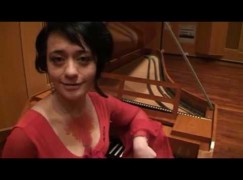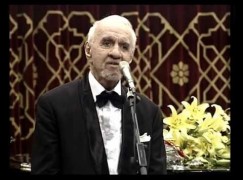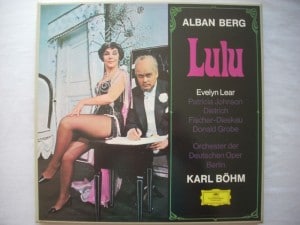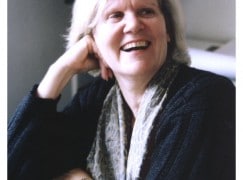The Daily Mail, which gets good police leaks, is reporting that John Martin, husband and manager of the pianist Natalia Strelchenko, has been arrested in connection with her murder.
Martin, 48, is a double-bass player. The Mail and other papers vastly inflate the extent of Natalia’s career and Martin’s involvement in it.
Read the report here.

Dan Iordachescu, the leading Romanian baritone who sang opposite Pavarotti and Domingo at La Scala, Paris and Vienna, has died after a long illness. He made more that 1,000 appearances on the international stage.

My Album of the Week on sinfinimusic.com examines a pianist who gives away less of himself in a concerto than he does in a solo recital. Read the review here.

Peabody Institute in Baltimore has announced the retirement of Gustav Meier, one of the world’s most sought-after conducting teachers. He will be succeeded by a former pupil, the Baltimore Symphony music director, Marin Alsop.

The Russian-born Norwegian pianist Natalia Strelchenko, 38, has been found battered to death in domestic premises at Newton Heath. A man, 48, has been arrested.
Natalia, who used the stage surname Strelle, had played recitals at the Wigmore Hall and the Weill Hall at Carnegie. She had management in the UK and Norway and recorded for Arena. Her website reports that she made her debut at age 12 with the St. Petersburg Symphony Orchestra.
She leaves grieving parents and a child.

It is with a sense of sic transit harmoniae mundi that we report the retirement from Bloomberg of Manuela Hoelterhoff, a formidable music critic formerly of the Wall St Journal who successfully created an arts outlet on the Bloomberg business site. Manuela is a personal friend and any further comment would be compromised by affection. So here’s the Bloomberg internal announcement and, below, one of her first pieces.
To all in Editorial and Research:
Manuela Hoelterhoff has decided to retire after 11 years during which she has written, edited and presided over more than 20,000 stories, weekend TV shows and radio segments on the arts, architecture, books and music, science, travel, the Nazis and Hamlette (the micropig NSN MAVFI70UQVI9<GO>). Manuela is one of the most versatile writers we’ve ever had, and we will miss her wit and sharp pen (for a taste of her columns, go to NI HOELTERHOF <GO> and NI MUSE <GO> and enjoy).
Manuela is already the recipient of a Pulitzer for Criticism and a Guggenheim fellowship. She is now moving offsite to finish her latest book on “Hitler’s Summer Seasons: Backstage With the Fuhrer” (it’s only 10 years overdue, as she points out). She promises that she will also spend quality time with her menagerie, especially Hamlette.
Please join me in wishing her well and thanking her for all her hard work.
John
Let Sippy Cups Into the Metropolitan Opera: Manuela Hoelterhoff
2014-02-28 05:00:01.1 GMT
Commentary by Manuela Hoelterhoff
Feb. 28 (Bloomberg) — Could attending the Metropolitan
Opera be made a bit more pleasant?
Not for the first time, I wondered about this possibility
the other night when winter winds mowed down frailer
ticketholders as they shivered in the narrow strip that passes
for a lobby.
The Met is huge. On that rare sold-out night, almost 4000
people squeeze past the “have your tickets ready” phalanx of
doormen who funnel us through the ticket-control people.
Why is there no lobby? Because the architect forgot to
build one! Yes, that oversight happened some 60 years ago and
might have been addressed by now — after all, Lincoln Center
was imaginatively reconceived quite recently at the cost of
billions. But no.
It’s not a bad idea to wear a nice hat like Brunnhilde when
you go to the Met during a polar vortex.
Or secrete a screw-top split of wine into a muff like
Mimi’s, since the Met’s few bars exist to thwart you from
drinking. The lines are ridiculous. A friend claims they are
really run by a secret outpost of AA.
Feed Me
This is so strange. If the performance is less than
wonderful, you might need the solace of a drink. If Jonas
Kaufmann has just made you delirious with his rendition of
Werther’s ode to nature, you might want to celebrate with a
glass of champagne. Why is this difficult to arrange?
The dingiest crush bar in London lets you reserve drinks
for intermission.
Hungry folks don’t fare well either. Who makes these huge
sandwiches? Godzilla? You need claws to unwrap the cellophane.
Perhaps the Met, which collaborates on productions with the
classy Bayerische Staatsoper, could borrow their caterers as
well? In Munich, every ticket holder is made to feel special.
The place glitters at intermission. The champagne bar gets
pretty crowded, but elegant little sandwich plates are handed
over quickly. Those ice-cream ladies ladling raspberry sauce
over lovely scoops of smooth vanilla. Heaven!
Back at the Met, you can trudge down to the dismally lit
coffee place downstairs near the car park and have a giant
cookie. Couldn’t an effort be made to provide something a little
less ordinary?
The Bathrooms
And what is that tacky souvenir table doing right smack in
the middle of the stairs leading to the orchestra seating? How
smart is that? I don’t want a blouse right now, thank you.
En route, the carpet is worn and patched with duct tape.
Money of course would solve a lot of problems, along with a
little flair, better lighting and more bathrooms.
How many more years do women have to spend inching toward
the bathrooms? Can’t a rich female sponsor associated with
promoting women take up the cause? Adrienne Arsht comes to mind.
The Met spent millions on rebuilding the stage to support
the “Ring” cycle sets. How about doing some renovations out
front?
Ticket sales are down. There are many reasons for that, but
changing audiences are surely one. The place needs to get a buzz
going and reinvent itself the way the Public Theater recently
did with a new lobby, sparkling bathrooms, and a cocktail bar
and supper club which stays open outside performance hours.
Looking Ahead
My ideas:

1. Open the Met an hour before, not half an hour, so people
can mingle.
2. Morph the useless and unloved gallery into a bar.
3. Turn the souvenir shop into a media center showcasing
material from the company’s huge archives and information on new
productions. Move the press room from its dim hole by the
bathrooms and provide seating for visitors to tweet. There’s
hardly any old-style press left anyway.
4. Get rid of the overpriced Grand Tier restaurant, which
blights a huge swathe of territory underneath one of the two
murals by Chagall. Have designer David Rockwell and Chef Marcus
Samuelsson create a casual dining space with bar tables and
sofas that flows across to the other Chagall.
5. Drop that pompous “no seating once the performance
starts” ukase. This is a place of entertainment. Every act has
a moment that is less sacred than others.
Sippy Cup
6. Permit drinks inside like the Brooklyn Academy of Music
and most New York theaters. For a long show in cramped seats, a
sippy cup can be your friend.
7. Expand and encourage the use of a free coat check. The
auditorium often looks like a refugee center.
8. In nice weather, fill that loggia with bars on both ends
and students from Juilliard next door playing operatic
transcriptions that drift enticingly to pedestrians below.
9. Start performing on Sundays. Is there another opera
company or theater that shuts down on Sunday to please unions?
10. Hire a charismatic music director to articulate a
vision for the future and excite a new generation. James Levine,
here since 1971, has never become a public personality
identified with New York. What is wrong with “emeritus”? The
Met needs a visible, socially engaged leader to supplement
general manager Peter Gelb. We need someone like Gustavo Dudamel
in Los Angeles or Riccardo Muti in Chicago. It’s time for a
change.
(Manuela Hoelterhoff is an executive editor at Bloomberg
News. All opinions are her own.)
The next in our series of Bruce Duffie interviews is with the first American soprano to break into the European new-music scene. She has some fabulous things to say about technique … and about concerthall formality:

‘When you go to these lieder recitals and the soprano or the tenor or the baritone tucks his hands under his chest and sings just to himself and everybody’s supposed to be quiet, and God forbid you should applaud between numbers, I think that’s horrible. I hate that. I hate any kind of pretension, but that’s me. I hate any kind of thing that is formalized. I think art is entertainment and entertainment should be art. That’s what it’s about! It’s communication and love being the vessel of what the composer intended, rolling it out across the stage to the audience to have them enjoy it! Why should they be tortured?’
Read the full interview here.
The Royal Overseas League, London, has issued the following notice:
DREADFUL NEWS – RODERICK LAKIN. Dear ROSL Members, Staff and Friends. Many will now know, although not all, that our wonderful colleague and friend, Roderick Lakin, our Director of ROSL ARTS, passed away yesterday. He had incurred severe head injuries, having been hit by a bus ten days ago while on duty leading our concert series on the Edinburgh Fringe. He never regained consciousness. We are devastated at this monumental loss and so sad for Roderick’s wife, Margaret, who was by his side when he died. There is no further news to pass on now. We believe that the post mortem process will take a number of days. We will keep everyone informed. For now, we ask for your thoughts and prayers for dear Margaret. Later on, we will consider how we best remember our wonderfully talented Roderick. Best wishes, Roddy Porter (Director-General ROSL).

Roderick was 65.
It’s bells, bells, bells today for Ksenija, soon to be Ksenija Sidorova Arizaga when she ties the knot with Jose Luis Arizaga Lobeto. Much happiness to them both.
Abbigail (sic) Cunkelman, of Blairsville, Pa., said she used the Swiss army knife to trim hairs on her bow. Her parents, who received a letter from the school in the vacation saying she would not be allowed back, are taking her case to court. Is the school being over-zealous? ignorant? safe?

After more than a year of political wrangling, Myung Whun Chung has announced he will step down next year as artistic director of the Seoul Philharmonic Orchestra.
His statement is slightly ambiguous in that it suggests he will continue to fulfil contracted concerts beyond the date of his departure and may return as a guest conductor.
But the definitive element of his resignation is that it will end one of the world’s most prosperous conductor-orchestra partnerships, a relationship that earned the Seoul Phil a 10-album DG contract and unprecendented international recognition.
These gains have been sacrificed to the ambitions of the ruling Park dynasty and other local oligarchs, who have meddled incessantly with the orchestra. When Chung leaves, the music dies in Seoul.

From the great soprano’s archived interview with Bruce Duffie.
BD: Is it good now that all the operas are done in the original language, with the text above so the people can follow exactly?
AS: No. [Laughs]
BD: [Genuinely surprised] No???
AS: No. I don’t like it. It’s important for so many opera-goers who never saw that opera, but I believe that they should come prepared, which is obviously not possible. They should come prepared, and if not, they should just have first the feeling and the idea about what’s going on. Then later on they can learn and go again, which is also a problem. I know that, but looking up all the time takes so much of their attention. Also for us, especially for me. I’m very far-sighted, and if the lights are not directly in my face then I see very far, and I see the public looking up, and that distracts me terribly. So it also takes my concentration a little bit away because I always think they are not interested. But of course they are. They’re just looking and reading.
Read the full interview here.












